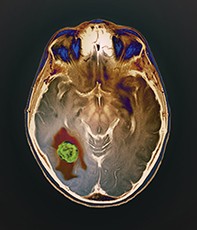Advanced melanoma: the changing landscape of treatment
Recently developed immunotherapies and targeted therapies have largely replaced chemotherapy for treatment of patients with metastatic and nonresectable melanoma. These new drugs have improved the prognosis for many patients, but GPs need to be aware of their unique toxicities.
Over the past few years there have been major advances in the systemic therapeutic options for patients with metastatic or unresectable melanoma. Previously, the mainstay of treatment was chemotherapy, which had low response rates and median survival times of six to nine months. Today, chemotherapy is rarely used and has been superseded as first-line therapy by a number of new targeted agents and immunotherapies. An understanding of these new agents, their unique toxicity profiles and their impact on prognosis will enhance the care of patients with advanced melanoma in primary care.
Picture credit: © Zephyr/Getty Images.

